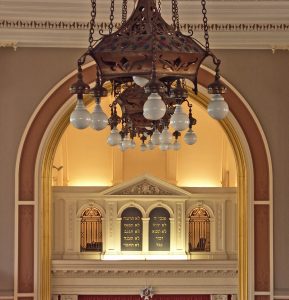We were founded in the aftermath of one of the greatest controversies in Anglo-Jewry – the Jacobs Affair. In the late 1950s-early 1960s there was broad agreement on the most charismatic, learned and significant leader in British Jewry – Rabbi Louis Jacobs, then Rabbi of the, orthodox, New West End Synagogue in St Petersburgh Place. It seemed inevitable he would become Chief Rabbi and he was offered and accepted a position at the Rabbinic training seminary, Jews College, where he could mentor his future Rabbinic colleagues.
But the right wing and many ultra-orthodox considered Rabbi Jacobs unreliable, dangerous even –though they were forced to respect his learning. Rabbi Dr Elliot Cosgrove, in his PhD thesis, suggests that Rabbi Jacobs’ first run-in with the ultra-orthodox was over the issue of celebrating Hallel on Yom Haatzmaut – celebratory Psalms on the anniversary of the creation of the State of Israel. Rabbi Jacobs was in favour, the ultra-orthodox, neither supporting the State of Israel, nor accepting that anything could prompt a change in liturgy, opposed.
Then came the publication of We Have Reason to Believe. This book, arising out of an adult education programme at New West End, was an attempt to give reasonable, intelligent lay Jews a theology they could believe in. Among its chapters were three on how the Torah came to be. Rabbi Jacobs set out, in the words of classic Rabbinic commentary, how Jews could, and should, accept that the Torah itself was a historical document – that the letters and words of the printed Chumashim weren’t an absolute reflection of 40 days of Divine dictation to Moses atop Mount Sinai. He also reflected on how an academic engagement with philology, archaeology and the like could be synthesised with the traditional view. He concludes one chapter, “with the splendid illustration given by Emil Brunner. Brunner asks us to think of a gramophone record. The voice we hear on the record is the voice want to hear, it is the actual voice of the artist who delights us, but we hear it through the inevitable distortions of the record. We hear the authentic voice of God speaking to us through the pages of the Bible – we know that it is the voice of God because of the uniqueness of its message and the response it awakens in our higher nature – and its truth is in no way affected in that we can only hear that voice through the medium of human beings who, hearing it for the first time, endeavoured to record it for us.” (p. 81)
The Jacobs Affair blew open sometime after publication of this book, never designed to inflame or be radical. Rabbi Jacobs was given the opportunity to recant and retract his view. He refused. He was removed from his post at Jews College and refused a ‘certificate of competency’ to return to his former, now vacant, position at the New West End.

At this point 500 friends and supporters rallied round their Rabbi, and the New London was formed. The first services took place in a Hotel Ballroom – and were chronicled by the national press. Around that time, however, St John’s Wood United Synagogue, formerly of 33 Abbey Rd, moved out of these premises into a new campus on Grove End Rd. The building here was moments away from being bulldozed when it was bought for the community, renovated and opened.
Rabbi Louis Jacobs led the community with distinction for over 40 years, as New London became a beacon for Anglo-Jewry. The Dalai Lama spoke here. Daniel Barenboim and Jacqueline du Pré performed here. All four Beatles attended the memorial service for Brian Epstein, manager of the group, (after the officiant at the funeral suggested Epstein was a “symbol of the malaise of his generation.”) Rabbi Jacobs praised Epstein, “He encouraged young people, to sing of love and peace rather than war and hatred.”
Following Rabbi Jacobs’ initial retirement, Rabbi Chaim Weiner served as rabbi for five years. Rabbi Jacobs then returned briefly before retiring a second time to be succeeded by Rabbi Reuven Hammer who served as interim-Rabbi. In 2008 Rabbi Jeremy Gordon returned to the Synagogue in which he grew up, now as Rabbi. In 2019 Rabbi Natasha Mann joined Rabbi Gordon.
Chazan George Rothschild served the community, in two stints, for over 30 years, with Chazan Stanley Brickman serving briefly in the 1960s. Chazan Stephen Cotsen joined the community (as Chazan) in 1999 and Cantor Jason Green served for four years, before Chazan Cotsen returned to New London in 2018.
We are grateful to all those, both clergy and lay, who have worked so hard to support this community and the possibility for open-minded and open-hearted engagement with Judaism we represent. We hope you will join us and become part of our bright future.
